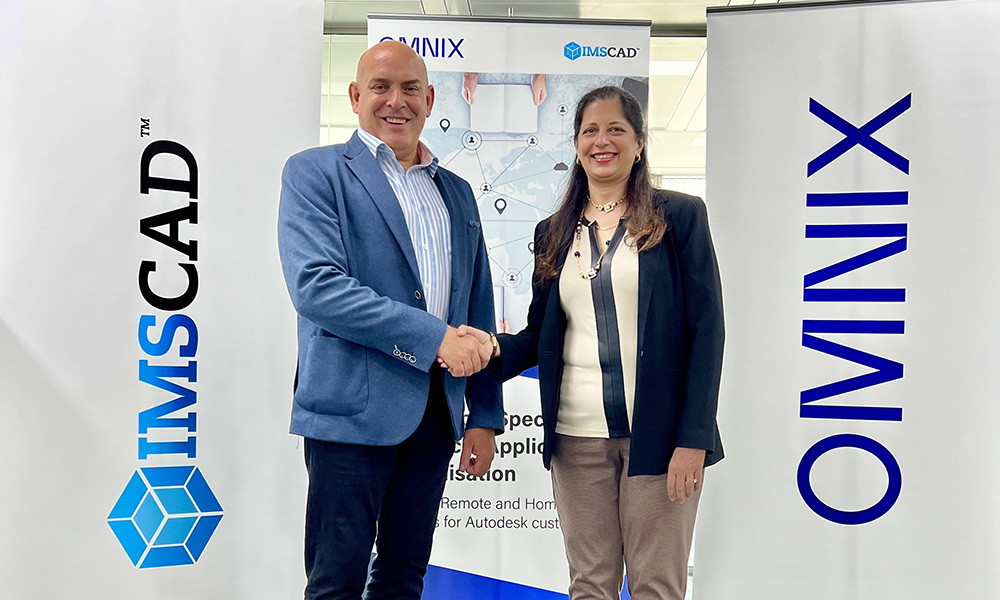Omnix and IMSCAD ink deal to bring VDI environments to AEC firms
The firms will be targeting the AEC, oil and gas and manufacturing sectors to deploy VDI solutions

Omnix International and UK-based virtualisation services specialist IMSCAD have announced a partnership, Middle East Construction News (MECN) can reveal. The seeds of the partnership were first laid some eight years ago and, following the outbreak of COVID-19 and the growing appetite in the built environment for digital transformation, and the need to work from different locations and devices, the two firms have inked a partnership, Adam Jull, CEO & Founder of IMSCAD tells MECN exclusively.
“We work very closely with Autodesk and our skills are around deploying graphical software in a VDI (virtual desktop infrastructure) or cloud environment. This allows people to work more flexibly and on different devices and such like away from the traditional workstation. Since Omnix and Autodesk have a long history of joint innovation, and Omnix has a broad reseller base, they were the perfect match for us to get into that customer base with our solutions and services,” says Jull.
Clarifying his firm’s focus, Jull notes, “We’re effectively a services business and, as we are independent, we go across all solutions, and we just advise our customers on what to do, and then they can decide whether to go ahead or not. To date we’ve got over 700 deployments under our belt and have Autodesk customers globally in VDI or cloud, so we have a lot of experience and expertise that we can offer to organisations in the region.”
Simran Bagga, Vice President of Omnix Engineering and Foundation Technologies points out that Omnix and Autodesk have worked together for over 30 years. She says that her firm was keen to partner with IMSCAD as it sensed a significant opportunity to provide an integrated virtual desktop environment for CAD modelling to customers in the region.
“This hasn’t really been happening in the region because of concerns around security, scalability and dependability and with hybrid work environments and the outbreak of the pandemic, things have been far more complicated than they need to be and can definitely be simplified going forward. Our partnership with IMSCAD will act as a value add complimentary solution for our current Autodesk partners and customers who are looking to expand their reach, their mindset, their businesses, and how they work and deal with virtual situations in today’s world,” explains Bagga.
In June 2022, Omnix and Abu Dhabi Municipality collaborated to push a mandate relating to infrastructure projects.

“The partnership with IMSCAD is a win-win because they bring us the technology and the know-how, and we bring them the channel ecosystem, and our experience in the region. We know the region well and have experience of working with partners and customers and they know the technology well. So I think we complement each other well,” she adds.
Security is a key concern for many organisations in the region and, on top of that, the built environment is notorious for being slow to adopt new technology due to several other reasons, all of which has meant that the industry has faced a number of challenges including lagging efficiency and productivity.
Asked for his take on security concerns within the sector, Jull states, “The good news is deploying a VDI solution is just about the most secure solution you could ever want. As the information gets through to people, they’ll realise this because centralising data on a central server – that’s what you do in a VDI – means that none of it is delivered out to the endpoint. Traditionally, when you’re using VPNs, which can be quite insecure in their own right, project data can go missing. You’ve got a memory stick culture of people taking data off the local machine and all this goes away in a VDI environment – it’s just pixels of keystrokes that are transmitted. With a VDI you’ve got a secure, locked down environment for your IP. It amazes me that people who are serious about security don’t already have some sort of VDI set up already, because it ticks so many of the security boxes.”
Asked about how scalable VDI solutions are and whether limited bandwidth at remote project locations may be an issue, Jull responds, “This is really interesting because if you imagine a remote site, you’ve got hardly any bandwidth – maybe a 3G or 4G connection. So, immediately you have to ask how you can download something like a Revit file to work on? With VDI, it’s actually quite low bandwidth requirements. So, depending on the platform you use, something like Citrix to the endpoint is very low, maybe 30 or 40 kilobits, across the connection because all the processing is done on the server, it’s not done on the endpoint. So that immediately solves that issue.”
Jull says that his firm advocates for people to try before they buy. “We have a demo environment at Omnix where customers can go and test our solutions, and they can try them from remote office sites and from their homes. This is where it really works well and that ties into where people really want it. Again with people’s homes, sometimes there’s questionable bandwidth because maybe the rest of the family is on YouTube or doing something else – with traditional VPNs, the norm is you sit and watch the spinning wheel for hours before you’ve got a file to work on and then you have to send it back as well. All this goes away with VDI, it’s instantaneous.”
In July 2022, Omnix Engineering’s Bhaskar Raman told MECN that in the near future, cloud-based digital twins will serve predominantly as an asset management environment.

Discussing how Omnix and IMSCAD will address the local market, Bagga states, “The big focus for us is on getting partners to be comfortable selling this technology because everybody wants to sell what’s in their comfort zone, and today these solutions are outside that zone. What we’re trying to do here is have a dedicated in house commercial resource whose job is to pitch the IMSDCAD solutions to our existing channel ecosystem because we have a very healthy channel ecosystem, given the fact that we are a reputed value added distributor.”
“Following that, we’re going to engage with the market with a number of activities including doing training webinars for our sales and technical partners and customers. We’ve defined a well-structured go to market strategy where we’re saying ‘hey, can we enable and recruit partners to think about this technology’. We’re also looking at how these partners can translate the experience they have to customers, so we’re keen to handpick a few of our partners to tell the story to their customers. We’re looking to put together a number of case studies in the next few months. There’s a lot of heavy lifting to do when it comes to showcasing technology like this.”
Jull adds, “From our point of view, we’ve built our business in the US and Europe and we do everything remotely – we remote consult, remote deploy and remote support. So, while we won’t be there in person if a customer wants to meet us, our teams in the UK manage all these companies and their requirements all over the world – we’ve done about 700 Autodesk customers in a virtual environment so far. It’s quite a specialist job and there are challenges but we focus on it day in and day out – that’s our specialisation as a company. This is what we sell; we actually guide a customer and liaise with the customer on what’s best for them, and then go and deploy it.”
Asked about the profile of companies they’re keen to target and which sectors show the most promise, Jull remarks, “AEC firms are obviously key but we’re also looking into the manufacturing and oil and gas sectors. One of Omnix’s partners is focused on the oil and gas market and they’ve just signed up with us.”
Bagga concludes, “We’re looking to focus on the UAE and Saudi Arabia as our key markets, followed by Kuwait, Qatar, Oman and Bahrain. There is no specific order of markets we want to focus on but we’ll go wherever we see opportunities to position and pitch these solutions. Saudi Arabia is definitely on our cards to visit and make a strong pitch for because of the amount of development happening in the country at the moment – technology such as this will help firms achieve their goals.”
In late November 2022, Omnix and viAct inked a deal to increase digitalisation and safety in the AEC and O&G sectors.


















